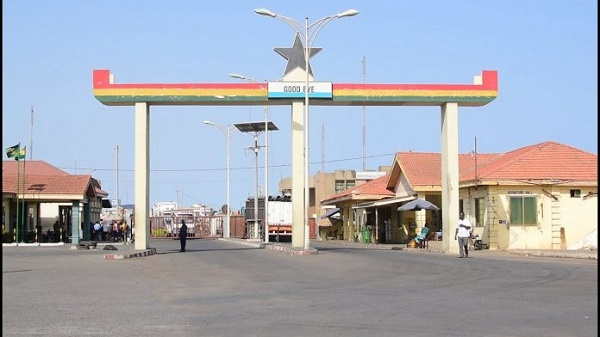Transport operators should direct their border closure issues to the relevant quarters, not the Ghana Immigration Service (GIS), according to Chief Superintendent (C/Supt) of Immigration Henry Asare, Deputy Aflao Sector Commander, Ghana Immigration Service (GIS).
He stated that requests for forbearance from the Command in enforcing the border closure policy, which was prompted by the breakout of COVID-19 in the country last year, were inappropriate.
- Motorists must abide by road regulations to reduce accidents – AMA Boss
- Ghana to lose ¢10m in road tolls from now to December – Kwame Agbodza
C/Supt Asare addressed at a meeting organized by the Ketu South Dialogue Platform, under the auspices of the Volta Regional Peace Council, of certain officers of the Command and leadership of transport operators in the Municipality.
Following earlier separate meetings with security providers and people in the transportation business, as well as public engagement through radio programs, the meeting aimed to iron out some misunderstandings between security officials (especially GIS) and Ketu South residents (transport operators in particular) in the aftermath of the border closure.
The Deputy Sector Commander said as the agency was mandated to regulate and monitor the entry and exit of people through the country’s frontiers, theirs was to enforce the nationwide directive by the President and ask the operators for compliance.
“We understand the directive is affecting your industry but we’re put in a tight corner. The economy may be bad, even traders in Kumasi are also suffering but the government still sees the need to close the border and we must ensure compliance. We’re leading this charge and the Military, Customs, Police, and others are assisting to seal the unauthorized border crossing points.
Direct your issues to the Transport Ministry or any other quarters and not us. The Economic Management Team is there, there’s also the Cabinet which assists the President in determining the general policies of the government. As long as the borders are closed, we’ll continue to intercept the people. We can’t sacrifice our work.”
C/Supt Asare appealed to drivers not to attempt resisting officers during the arrest of foreigners onboard their vehicles using assumptions that border security officials granted them entry into the country as justification.
“Our officers at the entry points are humans thus, some may be unfaithful or be moved by pleas by some of these foreigners. Aside from that, the borderline is vast and porous that people keep creating routes for entry. That’s why we have checkpoints and patrol teams as last resorts to intercept those who may beat security. Charge your normal fares and don’t have a problem with us if we try to arrest foreigners we find onboard your vehicles.”
Mr Cephas Kudjo Exe, Secretary, Transport Union Council of Aflao said livelihoods of vehicle owners, drivers and transport unions at Aflao had been negatively impacted due to the directive as they relied on the border for passengers to various locations in the country.
He said the already sorry state of their businesses was still suffering from GIS and their sister security agencies who would stop vehicles to profile passengers, disembark suspected illegal travelers, and at some points, return buses full of passengers to GIS Office at the main border where drivers were allegedly made to pay monies before allowed to go.
He called on Aflao GIS for leniency so they were not completely thrown out of business while praying that the government would soon open the borders to breathe life into their ailing businesses.
Mr David Esinu Normanyo, Executive Secretary, Volta Regional Peace Council who explained the purpose of the meeting said it was important for security providers and beneficiaries of security to collaborate for a resilient community that would not be susceptible to threats of violent extremism being experienced in the sub-region.
He described the meeting which raised concerns of money extortion from intercepted passengers and drivers, reentry of the intercepted, and free passage of some foreigners through the main border, however, the GIS explained that the monies were to arrange for repatriation and extra fares drivers charged the foreigners.
The meeting was the last engagement with key stakeholders by the Ketu South Dialogue Platform established by the National Peace Council with funding support from the United Nations Development Programme (UNDP) to guarantee peace in Ketu South, identified as one of two at-risk districts with poorly patrolled frontiers in the country.

